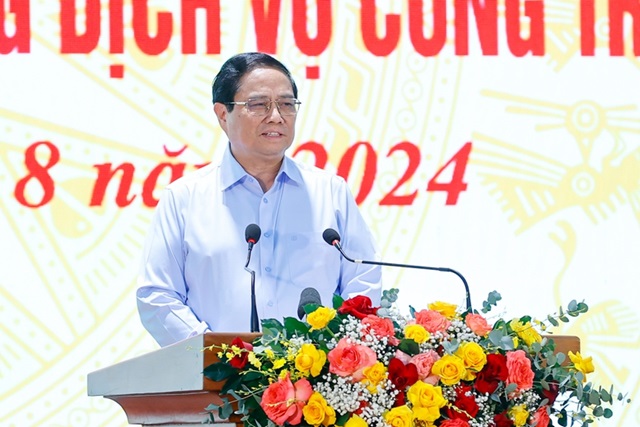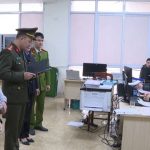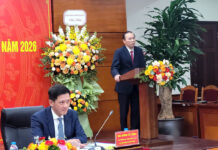
Prime Minister Pham Minh Chinh concluding the National Online Conference on Improving the Efficiency of Online Public Services – Photo: VGP
|
On the morning of August 31, in Da Nang, Prime Minister Pham Minh Chinh, Chairman of the National Committee on Digital Transformation, chaired the National Online Conference on Improving the Efficiency of Online Public Services.
The conference was connected online from the main venue at the Da Nang Public Administration Center to the People’s Committees of provinces and centrally-run cities.
Prime Minister Pham Minh Chinh basically agreed with the content of the reports, presentations, and opinions delivered at the conference. He assigned the Ministry of Information and Communications and the Government Office to absorb the opinions and complete the Conclusion of the Prime Minister, Chairman of the National Committee on Digital Transformation, for unified implementation in the coming time.
Prime Minister Pham Minh Chinh analyzed and emphasized some key contents regarding the political and legal basis; achievements, shortcomings, and limitations; causes, lessons learned; and orientations, tasks, and solutions for the next period in the deployment of online public services.
Regarding the political and legal basis, the Politburo issued Resolution No. 36-NQ/TW dated July 1, 2014, on promoting the application and development of information technology to meet the requirements of sustainable development and international integration.
The Central Committee issued Resolution No. 10-NQ/TW dated June 3, 2017, on developing the private economy, which clearly states: “Strengthening the application of information technology, modernizing public administration services to save time and cost in administrative procedures for people and enterprises.”
Resolution No. 52-NQ/TW dated September 27, 2019, of the Politburo on a number of guidelines and policies to actively participate in the Fourth Industrial Revolution sets the following targets for 2025: “Build a digital infrastructure that reaches the advanced level in the ASEAN region; 100% of communes have broadband Internet access… Ranked in the top four ASEAN countries in the United Nations’ e-Government rankings…
The Government issued Resolution No. 50/NQ-CP dated April 17, 2020, promulgating the Government’s action program to implement Resolution No. 52-NQ/TW of the Politburo; Resolution No. 76/NQ-CP dated July 15, 2021, promulgating the general program for state administrative reform in the 2021-2030 period. The Prime Minister has issued strategies and programs on digital transformation, e-government development, and digital economic and social development.
Eight outstanding results
Regarding the achievements, the Prime Minister clarified the following eight groups of results:
First, the leadership, direction, administration, and implementation have been drastically deployed synchronously with high determination from the central to local levels.
From 2021 up to now, the Prime Minister has issued nine decisions and five directives to guide the deployment of online public services to serve people and businesses. All 63 localities have issued policies on exempting and reducing fees and charges for online public services.
Second, there have been many positive changes in awareness and actions regarding improving the quality of service, satisfaction, and the implementation of administrative procedures (APs), and providing online public services. The satisfaction of people and businesses with the settlement of APs increased from 90% in 2022 to 93% by August 2024.
According to the United Nations’ assessment in 2022, Vietnam’s online public services ranked 76th out of 193 countries, up five places compared to 2020; open data ranked 87th out of 193 countries, up 10 places compared to 2020.
Third, the work of perfecting the institutional, policy, and legal framework to create favorable conditions for the provision of online public services and digitalization has been actively implemented. The National Assembly has promulgated the Law on Electronic Transactions; the Government has promulgated six decrees; and ministries and branches have issued four circulars within their competence.
Fourth, APs and business conditions have continued to be cut and simplified; the quantity and quality of online public services have been improved.
From 2021 up to now, nearly 3,000 business conditions have been cut and simplified; nearly 700 APs have been decentralized to localities. From 2021 up to now, nearly 1,800 online public services have been added, reaching 4,400 online public services provided on the National Public Service Portal, accounting for 70% of the total number of APs.
The rate of online public services increased from 28% in 2021 to 51.5% in August 2024. In particular, 43 out of 53 essential online public services have been deployed; of which, 23 out of 25 essential online public services according to Scheme 06 have been implemented in full online process, helping the State and society save nearly VND 3,500 billion per year.
The rate of digitization of dossiers and settlement results of APs at ministries and branches reached 43.4% (up 23% compared to 2023), and at localities reached 63% (up 35% compared to 2023).
Fifth, attention has been paid to investing in digital infrastructure, platforms, equipment, and technology for digital transformation in state agencies and serving people and businesses.
100% of state agencies have been deployed with the Specialized Data Transmission Network to the communal level for data exchange and sharing. 100% of ministries, branches, and localities have built and upgraded the Information System for AP Settlement. 82.2% of households use fiber-optic broadband Internet; 84% of mobile phone subscribers use smartphones.
Sixth, the construction, connection, and sharing of national and specialized databases have been promoted.
The National Database on Population has connected, shared, authenticated, and cleaned data with 18 ministries, branches, 63 localities, and four state-owned enterprises. More than 87.7 million chip-based ID cards have been granted; and more than 57.1 million VNeID accounts have been activated.
Seventh, a number of ministries, branches, and localities have made efforts to innovate and implement effective models and solutions in providing online public services for people and businesses, such as the Ministries of Public Security, Finance, and Industry and Trade; and localities such as Da Nang, Quang Ninh, Ca Mau, and Tay Ninh. These ministries and localities should be commended and their experiences should be learned, the Prime Minister emphasized.
Eighth, the Single Window ASEAN, National Single Window, and trade facilitation have been actively deployed, and customs digitalization has been ready for implementation. Vietnam is deploying the connection and exchange of ASEAN customs declarations with eight ASEAN member countries, creating a premise for further connection with South Korea, the Russian Federation, and New Zealand.
The National Single Window has provided 250 APs of 13 ministries and branches, with the participation of more than 70,000 businesses; millions of administrative dossiers have been handled on the electronic environment, shortening the time and reducing the cost of customs clearance.
On behalf of the Government, Prime Minister Pham Minh Chinh acknowledged, praised, and highly appreciated the efforts, dedication, and results achieved by ministries, branches, and localities; the strong and close direction of the National Committee on Digital Transformation; and the consensus, support, and active participation of the people and business community.
Along with the achievements, the implementation of online public services still has limitations and shortcomings. The building and perfecting of the legal environment, mechanisms, and policies need to be improved. AP reform is still slow and cumbersome.
The quality of online public services has not improved significantly; the results of online public services are uneven among agencies and units. Many online public services are not widely used by people and businesses or do not meet the requirements of full online processing. The rate of full online public services with generated dossiers in localities is only 17%, while the target for 2025 is a minimum of 80%. The reuse of data for people to provide information only once is still low.
The deployment of the Provincial-level AP Handling Information System and the National Public Service Portal still has many shortcomings. There are not many state management agencies that have implemented internal APs in an electronic environment. Digital human resources and infrastructure have not met the requirements and there has been no breakthrough. Cyber-attacks, especially ransomware, have increased strongly. Information, propaganda, and education to create consensus in society to promote online public services and Scheme 06 have not been paid attention to in many cases.
Analyzing the objective and subjective causes, the Prime Minister pointed out some lessons learned. Accordingly, the head of the agency must pay attention to leading, directing, organizing the implementation, inspecting, urging, and removing difficulties, and promptly commending and disciplining; at the same time, raising the sense of personal responsibility and strictly implementing administrative discipline.
“Practice also shows that ‘nothing is impossible’, the question is whether we are determined to do it, whether we know how to do it, how to mobilize resources and the strength of the people and businesses, and how to mobilize the whole political system,” the Prime Minister said.
People only need to provide information once to state agencies
Regarding orientations and tasks for the next period, the Prime Minister affirmed that digital transformation plays a very important role, contributing to changing the leadership and direction in the new situation, in a suitable, effective way, and improving policy response capacity.
The Prime Minister directed 1 goal, 2 pillars, 3 breakthroughs, 4 nos, and 5 strengthening measures in the deployment of online public services.
1 common goal is to reduce compliance costs and processing time, facilitate and best serve people and businesses.
2 pillars include: resolutely cutting internal administrative procedures and creating favorable conditions for the provision of online public services to serve people and businesses.
3 breakthroughs are legalization; digitization; and automation.
“4 nos” are: no paper; no cash; no direct contact if not required by law; and no one left behind.
“5 strengthening” includes: (1) Strengthening decentralization and empowerment, along with resource allocation and improvement of implementation capacity, clearly defining the responsibilities of each individual, each level, and each sector and strengthening supervision and inspection; (2) Strengthening publicity, transparency, and simplification of APs in association with data integration, connection, and sharing; (3) Strengthening investment in digital infrastructure; (4) Strengthening dialogue and handling difficulties and problems that arise; promoting discipline and pushing back negative behavior; and (5) Strengthening digital knowledge and skills and developing digital human resources to meet the requirements of the new situation.
Regarding the main tasks and solutions for the coming time, the Prime Minister first of all requested that ministries, branches, and localities proactively and actively deploy tasks, especially promoting the role of the head of the agency in the deployment of online public services.
Second, focus on building and perfecting the institutional, policy, and legal framework, in which reviewing, detecting, and promptly amending and supplementing inconsistencies and contradictions in the system of regulations and legal documents, and difficulties and obstacles in reality, in the spirit that whatever is practical, required, and clear, must be amended, supplemented, and designed into regulations to create a legal corridor for implementation, thereby removing “bottlenecks”, promoting, and unleashing all resources for socio-economic development. “Open policy, smooth infrastructure, and intelligent governance,” the Prime Minister said.
Cut, simplify to the maximum extent, and remove business conditions and APs; resolutely eliminate the “asking – giving” mechanism; create an open, transparent, and clean environment for officials not to commit violations; and actively prevent and combat corruption and negative behavior;
Promote the cutting and simplification of internal administrative procedures (cutting and simplifying at least 50% of APs and reducing at least 50% of AP compliance costs) and strongly shift to the processing of dossiers and tasks in an electronic environment. Urgently decentralize APs to localities. Soon submit to promulgate full decrees guiding the implementation of the Law on Electronic Transactions (Ministry of Information and Communications is the main agency in charge).
Amend and supplement legal provisions on APs related to imported and exported goods, transited goods; and means of transport and people entering and exiting, transiting in the direction of using administrative dossiers in the form of digital data.
Third, focus on improving the quality of online public services.
Review, evaluate, and innovate the provision of online public services to ensure that they meet the requirements of level, convenience, simplicity, and friendliness to users.
Promote the restructuring of processes, design, and provision of public services on the basis of cutting, simplifying to the maximum extent APs, reusing data, and electronic connection. Successfully implement the tasks so that by 2025, 100% of APs that meet the conditions will be provided in the form of full online public services; at least 80% of AP dossiers will be fully handled online. Complete the provision of all 53 out of 53 essential online public services according to Scheme 06.
Soon have research and evaluation to expand the provision of online public services for public non-business and public utility services to perfect the ecosystem in the electronic environment for people and businesses.
Continue to innovate and improve the quality of activities of the Public Administration Service Centers and One-Stop Shops at all levels, turning them into digitization points, providing non-administrative public services, and supporting people and businesses in digital transformation, especially the weak subjects.
Fourth, promote the digitization of dossiers and settlement results of APs; build, complete, and put into operation national and specialized databases; strengthen connection, sharing, and reuse of data to serve the settlement of APs and the provision of public services so that people only need to provide information once to state agencies.
Strengthen negotiations with Vietnam’s trading partners for mutual recognition of standards and technical regulations along with the exchange of information and mutual recognition of commercial/administrative data and documents.
Fifth, continue to pay attention to and invest in developing the information technology infrastructure to meet the requirements of smooth and effective national digital transformation. Focus on building the National Data Center in accordance with Resolution 175 of the Government. Continue to upgrade and perfect the National Public Service Portal, the AP Handling Information System at the ministerial and provincial levels, to fully meet the requirements of digital transformation. Urgently eliminate signal and power-deprived areas. Strengthen investment in machinery, equipment, and technology to better meet the requirements of tasks.
Sixth, conduct a comprehensive review and evaluation of the situation of ensuring information security and safety for information systems under the management according to the guidance of the Ministry of Public Security, the Ministry of National Defense, and the Ministry of Information and Communications.
Seventh, innovate and improve the effectiveness of propaganda, guidance, and support for the implementation of online public services for people and businesses. The Ministry of Information and Communications shall urgently complete and submit the Scheme “Propaganda and dissemination on the provision and effective use of online public services towards 2025, with an orientation towards 2030” in September 2024.
“The most important thing is to raise awareness of the position, role, and importance of digital transformation for the rapid, comprehensive, and sustainable development of the country, improving the material and spiritual life, and ensuring happiness and warmth for the people. All levels and sectors, especially the heads, must thoroughly grasp the spirit of taking the lead, directing, and closely and effectively implementing, inspecting, urging, and removing difficulties, and promptly commending and disciplining in this work,” said the Prime Minister, believing that after this conference, the provision and use of online public services will continue to have positive and strong changes, with results in the next quarter higher than in the previous quarter and in the next year higher than in the previous year.
The most extensive bribery case ever in Thanh Hoa: Numerous suspects prosecuted for “Giving and Receiving Bribes”
The Provincial Security Investigation Agency (PSIA) of Thanh Hoa province announced on January 31st that it has made the decision to initiate a prosecution against 23 individuals in connection with the offenses of “Accepting bribes” and “Giving bribes” as stipulated in Article 354(3) and Article 364(2) of the Criminal Code.
Mobile World achieves revenue of VND118,000 trillion: TVs, tablets, and phones all decrease by 10% – 50%, while one product grows in both quantity and revenue.
Mobile World Investment Corporation (MWG) has recently announced its 2023 business results. According to the report, the company’s consolidated revenue reached over 118 trillion Vietnamese dong, equivalent to 89% of the revenue in 2022.












































